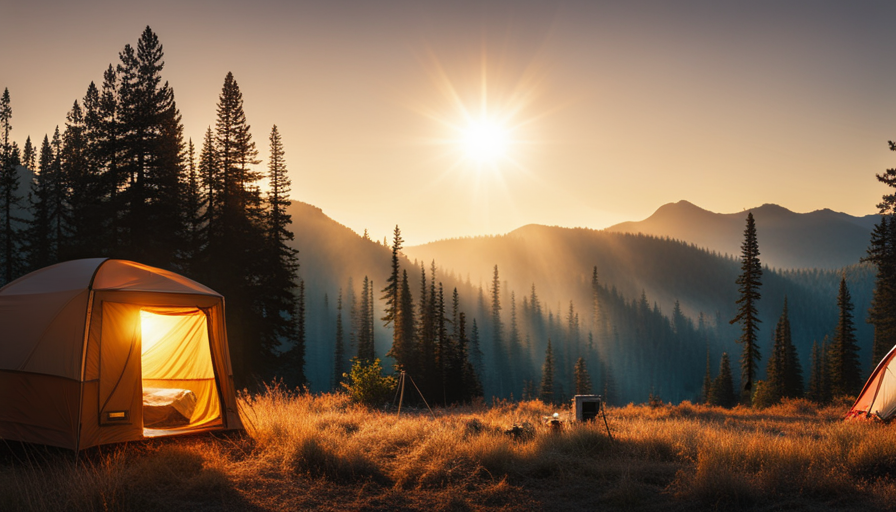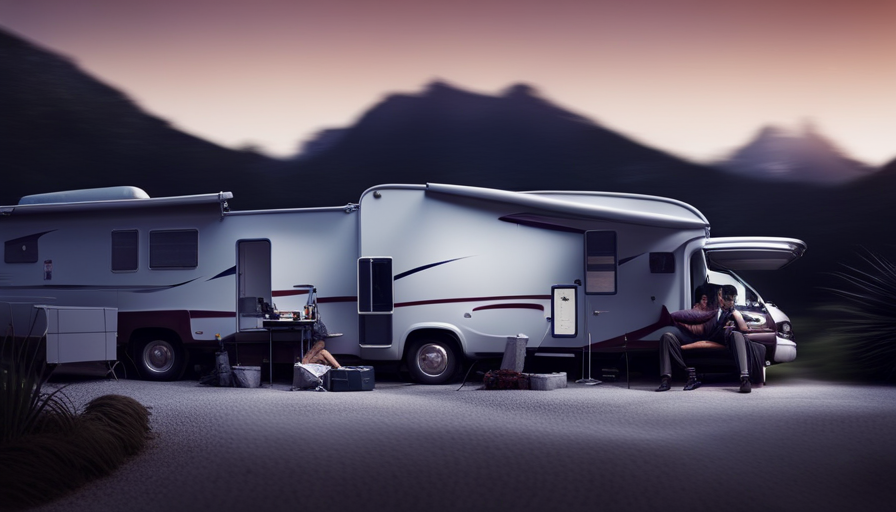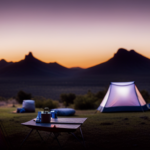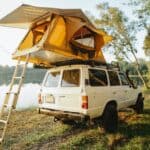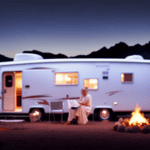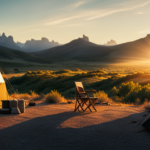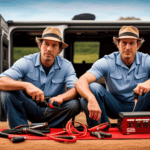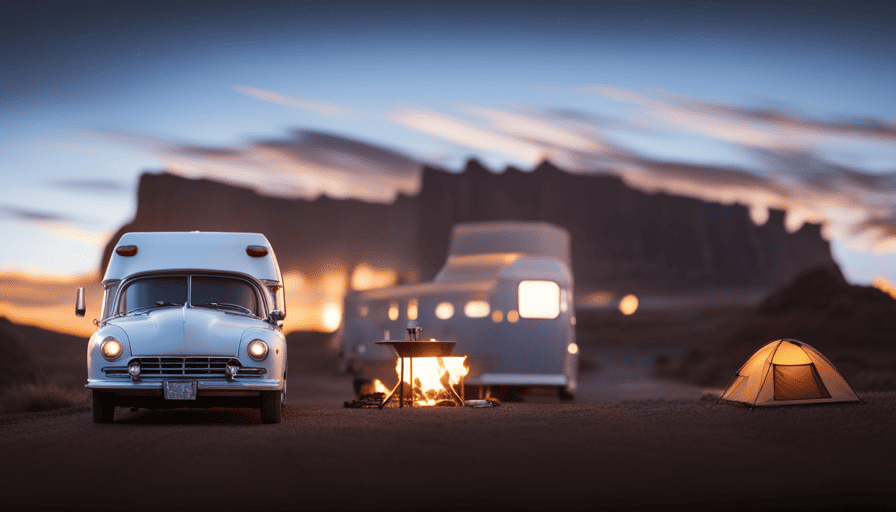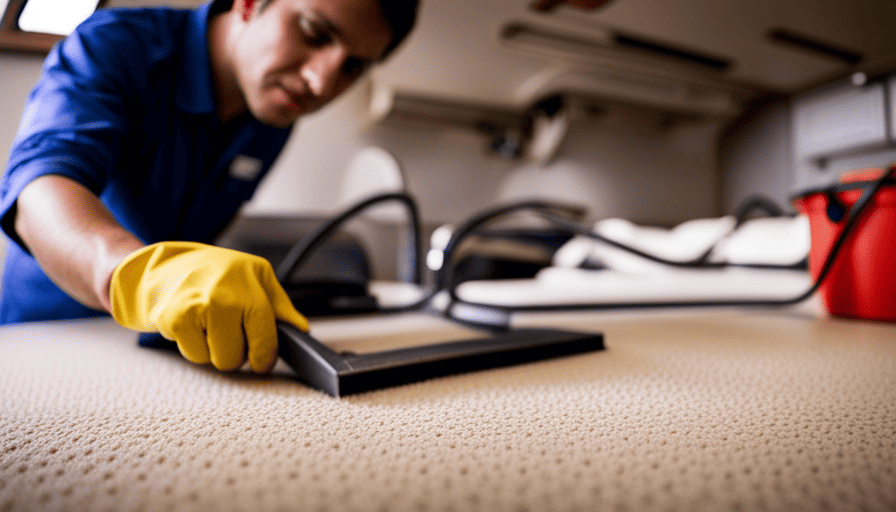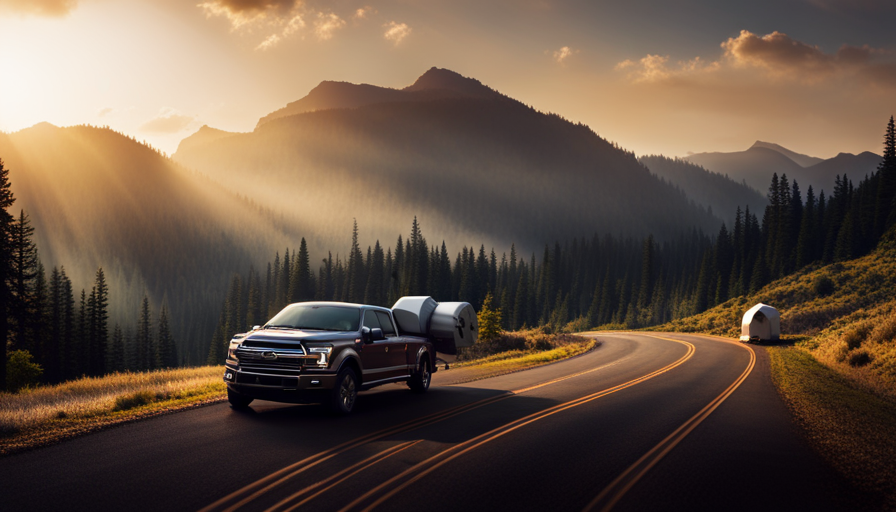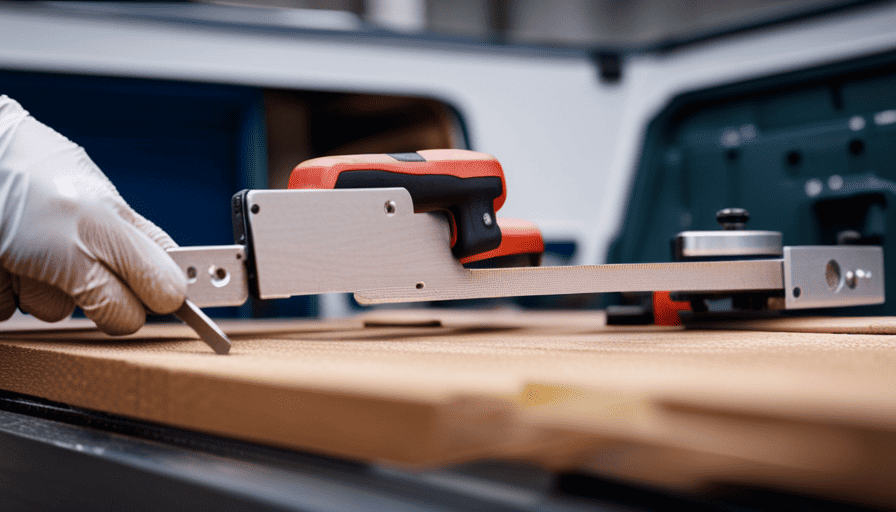You might believe that camping without access to modern amenities involves giving up on comfort, but let me assure you that it doesn’t have to be the case. With the proper equipment and some basic know-how, you can keep your camper powered and relish in the conveniences of home even when surrounded by nature.
When it comes to powering a camper off the grid, it’s all about understanding your power needs and finding sustainable solutions. That’s why I’m excited to share my experience and practical tips with you. I’ve spent years exploring remote destinations and perfecting my off-grid power setup, so you can trust that these methods are tried, tested, and reliable.
From investing in solar panels and utilizing a portable generator to installing a battery bank and using energy-efficient appliances, there are numerous ways to power your camper off the grid.
I’ll also show you how to incorporate wind turbines or hydroelectric systems for added sustainability. Plus, I’ll share tips on using propane for cooking and heating, planning for water and waste management, and being prepared for emergencies.
So, if you’re ready to embrace the freedom of off-grid camping without sacrificing the comforts of home, let’s dive in and discover how to power your camper off the grid like a seasoned pro.
Key Takeaways
- Understanding power needs and selecting the right power options for off-grid camping
- Proper installation and maintenance of solar panels or portable generators for sustainable power solutions
- Calculating and maintaining battery bank capacity to ensure reliable power supply
- Implementing energy-efficient practices such as using LED lights, energy-star rated appliances, and proper insulation to conserve power.
Assess Your Power Needs
Assessing your power needs is crucial when it comes to powering your camper off the grid, so let’s dive in and figure out what you’ll need!
The first step in assessing your power needs is to estimate your power usage. Consider the appliances and devices you plan to use in your camper, such as lights, refrigerator, water pump, and electronics. Determine their power requirements and calculate the total wattage they consume. This will give you an idea of how much power you’ll need to generate or store.
Once you have an estimate of your power requirements, it’s time to create a power budget. This involves determining how long you plan to camp off the grid and how much power you’ll need each day. Consider factors like the weather, season, and duration of your trip. With a power budget in place, you can make informed decisions about the type and size of power system you need.
Now that you have a clear understanding of your power needs, it’s time to explore options for generating power off the grid. One popular choice is to invest in solar panels. These panels harness the sun’s energy and convert it into electricity to power your camper. Solar panels are a sustainable and eco-friendly solution that can provide ample power for your needs. By incorporating solar panels into your camper’s power system, you can enjoy the freedom of off-grid camping without compromising on comfort or convenience.
Invest in Solar Panels
When it comes to investing in solar panels for my camper, I know the importance of choosing the right size and type. This ensures that I have enough power to meet my needs while also maximizing the efficiency of the panels.
Once I’ve selected the appropriate panels, I take the time to properly install them on my camper, ensuring that they’re securely mounted and positioned for optimal sun exposure.
By following these steps, I can confidently harness the power of the sun and enjoy off-grid adventures without worrying about running out of power.
Choose the right size and type of solar panels
To effectively power a camper off grid, it’s crucial to select the appropriate size and type of solar panels. On average, a 100-watt solar panel can generate around 30 amp-hours per day.
When choosing solar panels for your camper, it’s important to consider your power needs and the available space on your vehicle. If you have limited space, flexible solar panels are a great option as they can be easily mounted on curved surfaces. On the other hand, if you have ample space, rigid solar panels might be more suitable as they generally have higher efficiency and durability.
Additionally, it’s essential to ensure that the solar panels you choose are compatible with your camper’s battery system. Once you have selected the right size and type of solar panels, you can proceed to the next step of installing them on your camper.
Install the solar panels on your camper
Start by finding a sunny spot on your vehicle where you can install the solar panels and soak up all that glorious sunlight.
When it comes to installing solar panels on your camper, there are a few key things to consider. First, make sure you choose the right type of solar panels for your needs. There are portable solar panels that you can move around as needed, or you can opt for a rooftop installation for a more permanent setup.
Once you’ve decided on the type, carefully follow the manufacturer’s instructions for installation. Make sure the panels are securely attached to your camper and positioned at the optimal angle to capture the most sunlight.
With the solar panels installed, you’ll be well on your way to powering your camper off the grid.
Now let’s move on to the next step and talk about how to use a portable generator.
Use a Portable Generator
When it comes to using a portable generator to power your camper off the grid, there are a few key points to keep in mind.
First, it’s crucial to select a generator with the right power capacity for your needs. This will ensure that you have enough power to run all of your appliances and devices without overloading the generator.
Additionally, it’s important to store and transport the generator safely, as they can be heavy and potentially dangerous if not handled properly.
By following these guidelines, you can confidently use a portable generator to keep your camper powered while enjoying the great outdoors.
Select a generator with the right power capacity
Find a formidable generator with the fitting power capacity to fuel your freedom on the road.
When it comes to selecting a generator for off-grid camping, ensuring the right power capacity is crucial. Not only will it provide you with the necessary energy to run your camper, but it’ll also help you avoid overloading the system.
To determine the right power capacity, consider factors such as the appliances and devices you plan to use, their wattage requirements, and the duration of your trips. Additionally, proper generator maintenance and power management techniques are essential to maximize its efficiency. By following regular maintenance schedules and implementing power-saving strategies, you can extend the lifespan of your generator and optimize fuel consumption.
Now, let’s move on to the next section and discuss how to store and transport the generator safely.
Store and transport the generator safely
Ensure the safety of your generator by properly storing and transporting it, allowing peace of mind as you embark on your adventures. Safe transportation is essential to prevent any damage or accidents. When transporting your generator, secure it tightly in the back of your vehicle or camper to prevent it from shifting during travel. Use straps or bungee cords to keep it in place.
Additionally, store your generator in a well-ventilated area to prevent the build-up of fumes. Regular maintenance is also crucial to keep your generator in optimal condition. Clean the air filters regularly and check the oil levels before each use. Inspect the generator for any signs of wear or damage and address them promptly.
By taking these precautions, you can ensure that your generator remains safe and reliable.
Now, let’s move on to the next step of installing a battery bank.
Install a Battery Bank
To successfully power your camper off-grid, you should start by installing a battery bank. This is an essential component that’ll store and provide electrical power for your camping adventures.
Here are some key points to consider when installing a battery bank:
-
Choose the right batteries: Opt for deep cycle batteries specifically designed for off-grid use. These batteries are designed to provide a steady and reliable power supply.
-
Proper battery maintenance: Regularly check the battery fluid levels and clean the terminals to ensure proper functioning. It’s also important to avoid overcharging or completely discharging the batteries, as this can significantly reduce their lifespan.
-
Determine the battery capacity: Calculate your power needs and choose a battery bank with enough capacity to meet them. Consider the appliances and electronics you’ll be using in your camper.
-
Install a battery monitor: This device helps you keep track of the battery’s charge level and ensures that you don’t drain it completely.
-
Consider a solar panel system: Installing solar panels can help recharge your battery bank during the day, reducing reliance on other power sources.
By installing a battery bank and following proper battery maintenance, you can ensure a reliable power supply for your off-grid camping adventures.
After setting up your battery bank, the next step is to utilize energy-efficient appliances to maximize your power usage and minimize your environmental impact.
Utilize Energy-efficient Appliances
Maximizing your energy usage while minimizing your environmental impact can be achieved by utilizing energy-efficient appliances in your camper. When living off-grid, it’s essential to find ways to conserve energy and reduce your carbon footprint.
One of the most effective ways to do this is by investing in energy-saving appliances. These appliances are designed to use less power without compromising their functionality. Start by choosing energy-efficient options for your refrigerator, stove, and air conditioning unit. Look for appliances with an Energy Star rating, as they meet strict energy efficiency guidelines.
Additionally, consider using LED lights throughout your camper, as they consume significantly less energy compared to traditional incandescent bulbs.
Furthermore, make sure to properly maintain and clean your appliances regularly. This not only ensures their optimal performance but also extends their lifespan. Simple tasks like defrosting your freezer, cleaning the air filters, and checking for any leaks can make a significant difference in energy consumption.
By incorporating energy-saving tips and utilizing eco-friendly appliances in your camper, you can significantly reduce your energy usage and live more sustainably. In the next section, we will discuss how to practice energy conservation without compromising your comfort.
Practice Energy Conservation
Create a cozy ambiance in your living space by using soft, warm lighting and adjusting your thermostat to a comfortable temperature. When it comes to living off-grid in a camper, energy conservation is key. By implementing energy-saving tips and reducing power consumption, you can maximize the use of your resources and prolong your off-grid adventures.
One simple way to conserve energy is to switch to LED lights. LED bulbs are not only more energy-efficient, but they also last longer than traditional incandescent bulbs. Additionally, consider using natural light during the day by opening curtains or blinds. This not only saves energy but also creates a bright and airy atmosphere inside your camper.
Another energy-saving tip is to unplug electronics and appliances when they’re not in use. Many devices continue to draw power even when they’re turned off, so it’s important to disconnect them from the power source. Investing in power strips with individual switches can make this process easier and more convenient.
Additionally, be mindful of your heating and cooling needs. Insulating your camper and sealing any drafts can help maintain a comfortable temperature without relying heavily on heating or air conditioning. Utilize fans or portable heaters when necessary, and adjust your thermostat to a temperature that’s comfortable but not excessive.
By practicing energy conservation and implementing these energy-saving tips, you can reduce power consumption and make your off-grid experience more sustainable. Transitioning into the subsequent section about wind turbines or hydroelectric systems, consider further exploring renewable energy sources to power your camper off-grid.
Consider Wind Turbines or Hydroelectric Systems
If you’re looking to enhance your off-grid living experience, consider harnessing the power of wind turbines or hydroelectric systems for a sustainable and eco-friendly energy source. Wind turbines and hydroelectric systems can provide a consistent source of power, allowing you to run your camper’s appliances and charge your devices without relying on traditional grid power.
When it comes to wind turbines, regular maintenance is crucial to ensure optimal performance. This includes inspecting the turbine for any damage, cleaning the blades, and lubricating moving parts. It’s also important to regularly check the electrical connections and wiring to ensure everything is working properly. By following a regular maintenance routine, you can keep your wind turbine operating efficiently for years to come.
On the other hand, hydroelectric systems harness the power of flowing water to generate electricity. One of the main benefits of hydroelectric power is its reliability. As long as you have access to a water source, such as a river or stream, you can generate a consistent amount of power day in and day out. Additionally, hydroelectric power is renewable and produces zero emissions, making it an environmentally friendly choice.
By incorporating wind turbines or hydroelectric systems into your off-grid camper, you can enjoy the benefits of sustainable energy while minimizing your carbon footprint. With these energy sources in place, you can then focus on other aspects of off-grid living, such as using propane for cooking and heating.
Use Propane for Cooking and Heating
To enhance your off-grid living experience, why not utilize propane for cooking and heating in your cozy abode? Propane is a reliable and efficient fuel source that can power a variety of appliances, making it an excellent choice for off-grid living.
When it comes to safety, propane is highly regulated and has strict guidelines in place to ensure its safe use. However, it’s important to follow proper safety precautions, such as regular maintenance and inspections, to prevent any potential issues.
Propane appliances offer several advantages over electric appliances. Firstly, propane-powered stoves and ovens provide precise temperature control, allowing you to cook your meals to perfection. Additionally, propane heaters can quickly and efficiently warm up your camper, even in the coldest of winters. Unlike electric heaters, propane heaters don’t rely on electricity, making them a reliable option in remote off-grid locations.
Using propane for cooking and heating in your camper eliminates the need for electricity, reducing your dependence on the grid. This not only helps you live a more sustainable lifestyle but also saves you money in the long run. So, consider incorporating propane appliances into your off-grid setup for a comfortable and efficient living space.
When planning for water and waste management, there are several strategies that can help you maintain a sustainable and environmentally friendly system.
Plan for Water and Waste Management
When planning for water and waste management in my camper, I always make sure to install a water storage and filtration system. This allows me to have a reliable source of clean drinking water even when off the grid.
Additionally, I prioritize using environmentally-friendly methods for waste disposal, such as composting or using biodegradable products. This not only reduces my impact on the environment but also helps to keep my camper clean and odor-free.
Install a water storage and filtration system
Imagine transforming your camper into a self-sustaining oasis by effortlessly incorporating a water storage and filtration system. Water conservation is key when living off-grid, and a water storage system allows you to collect and store rainwater for everyday use. By installing rain barrels or a larger water tank, you can capture and store rainwater during wet seasons, ensuring a constant supply of water even in dry periods.
To ensure clean and safe water, a filtration system is essential. A combination of filters, such as activated carbon and ceramic filters, will remove impurities and harmful contaminants, providing you with fresh drinking water. These systems are easy to install and maintain, making them a practical addition to any off-grid camper.
With proper water management in place, the next step is to use environmentally-friendly methods for waste disposal, ensuring a sustainable and eco-friendly lifestyle.
Use environmentally-friendly methods for waste disposal
When it comes to living off grid in a camper, finding environmentally-friendly methods for waste disposal is essential. One option is to use composting toilets, which are designed to break down waste into compost that can be used as fertilizer. Not only are these toilets odorless and easy to maintain, but they also save water, making them a sustainable choice for off grid living. Another option is to use biodegradable waste bags, which can be used for collecting and disposing of solid waste. These bags are made from materials that break down naturally over time, reducing the impact on the environment. By incorporating these eco-friendly waste disposal methods into your off grid camper lifestyle, you can minimize your ecological footprint and contribute to a more sustainable future. Now, let’s discuss how to be prepared for emergencies in your off grid camper.
Be Prepared for Emergencies
When it comes to being prepared for emergencies while living off-grid in a camper, it’s crucial to have backup power sources readily available. This can include portable generators, solar panels, or even a backup battery system.
Additionally, it’s essential to carry essential tools and equipment for maintenance and repairs. Having a well-stocked toolbox with items like wrenches, screwdrivers, and spare parts can make all the difference when unexpected issues arise.
Being proactive and prepared in these areas can ensure a smooth and worry-free off-grid experience.
Have backup power sources available
To ensure you’re always prepared, make sure you’ve got backup power sources readily available when powering your camper off grid. Backup power options are essential in case your primary power source fails or runs out.
There are various alternative energy sources you can consider, such as solar panels, wind turbines, or even portable generators. Solar panels are a popular choice as they harness the sun’s energy and can be easily installed on the roof of your camper. Wind turbines are another option, especially if you’re in an area with consistent winds. Portable generators can provide an extra power boost when needed.
Having these backup power sources on hand will give you peace of mind during your off-grid adventures.
Additionally, it’s important to carry essential tools and equipment for maintenance and repairs, ensuring you can quickly address any issues that may arise.
Carry essential tools and equipment for maintenance and repairs
It’s crucial to have a well-stocked toolbox with all the necessary tools and equipment for maintenance and repairs. This ensures you can swiftly fix any unexpected issues that may arise during your off-grid adventures. As someone who’s been powering my camper off-grid for years, I know the importance of carrying essential tools and being prepared for any situation.
When it comes to maintenance and repairs, having carpentry skills can be invaluable. You never know when you may need to repair a broken cabinet or reinforce a loose structure. Additionally, having plumbing essentials is essential to address any leaks or clogs that may occur. From pipe wrenches to plumber’s tape, having these tools readily available can save you time and money.
By being prepared with the right tools and equipment, you can confidently tackle any maintenance or repair tasks that come your way.
Frequently Asked Questions
What are the best types of energy-efficient appliances to use in a camper off-grid?
When it comes to energy-efficient appliances for off-grid campers, there are a few key options to consider. Look for appliances that have high energy star ratings and are specifically designed for off-grid use. LED lights, compact refrigerators, and propane stoves are great choices.
Additionally, implementing simple tips like minimizing phantom power usage, insulating the camper, and using natural ventilation can further reduce energy consumption. By combining these appliances and strategies, you can maximize your energy efficiency while enjoying the freedom of off-grid camping.
How much power can a battery bank typically hold and how long can it last?
A battery bank typically has a specific capacity, which refers to how much power it can hold. The capacity of a battery bank can vary depending on its size and the type of batteries used.
As for the lifespan of a battery bank, it can last anywhere from a few years to several years, depending on factors such as usage patterns, maintenance, and the quality of the batteries.
It’s important to regularly monitor and maintain your battery bank to ensure optimal performance and longevity.
Can wind turbines and hydroelectric systems be used together to generate power for a camper?
Yes, wind turbines and hydroelectric systems can be used together to generate power for a camper. Wind turbines harness the power of the wind to generate electricity, while hydroelectric systems use flowing water to produce power.
The combination of both systems allows for a more reliable and consistent power source, especially in areas where wind and water resources are abundant. However, it’s important to consider the installation and maintenance costs, as well as the environmental impact of these systems.
How much propane would be needed for cooking and heating in a camper off-grid?
In my experience, when it comes to cooking and heating in a camper off-grid, propane is a reliable and efficient option. While there are energy efficient propane alternatives available, such as electric stoves or diesel heaters, they may not always be practical in a remote camping environment.
Propane provides instant heat and is readily available. However, it’s important to consider the cons of using propane, such as the need for regular refills and the potential risk of leaks or carbon monoxide poisoning.
What are some essential items to have in an emergency kit for a camper off-grid?
In an emergency kit for off-grid camping, it’s crucial to have essential items for safety and survival. Some must-have contents include:
- A first aid kit
- Emergency food and water supplies
- A flashlight
- Extra batteries
- A multi-tool
- A portable phone charger
- A fire extinguisher
- A hand-crank or solar-powered radio
Additionally, it’s wise to pack:
- A waterproof tarp
- Matches or a lighter
- A whistle
- A compass
- A basic tool kit for any repairs that may arise during your camping adventure.
Can I Use Renewable Energy Sources to Power My Camper Off-Grid?
When it comes to powering a camper off-grid, using renewable energy sources is a sustainable and reliable option. Solar panels can be installed on the roof of the camper to harness sunlight and convert it into electricity. This eco-friendly approach ensures a constant power supply, eliminating the need to rely on traditional fuel sources. Additionally, wind turbines or portable generators can also be employed to generate power while exploring the great outdoors. With renewable energy, adventurers can truly embrace a greener and more self-sufficient camping experience.
Conclusion
In conclusion, powering a camper off-grid is not only possible, but it can also be a rewarding and sustainable way to live. By assessing your power needs and investing in solar panels, using a portable generator, and installing a battery bank, you can create a self-sufficient and environmentally friendly lifestyle.
Utilizing energy-efficient appliances, considering wind turbines or hydroelectric systems, and using propane for cooking and heating are also important factors to consider. Additionally, planning for water and waste management and being prepared for emergencies are crucial aspects of off-grid living.
Did you know that a single wind turbine can generate enough power to charge your camper’s battery for a week? Imagine the freedom of exploring the great outdoors without having to worry about running out of power. With the right setup and a little bit of knowledge, you can truly go off the grid and enjoy the beauty of nature.

